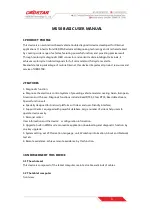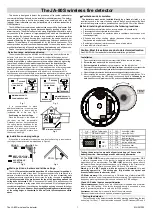Summary of Contents for Eclox
Page 1: ...2886888 Eclox Rapid Response Test Kit User Manual 01 2018 Edition 5 ...
Page 2: ...Visit us at www hach com ...
Page 6: ...Table of Contents Table of Contents Page 6 EcloxTOC fm ...
Page 14: ...14 ...
Page 24: ...24 ...
Page 46: ...46 ...
Page 52: ...52 ...
Page 110: ...110 ...
Page 113: ...113 ...
Page 114: ...Visit us at www hach com ...
Page 120: ...120 ...
Page 123: ...123 ...



































